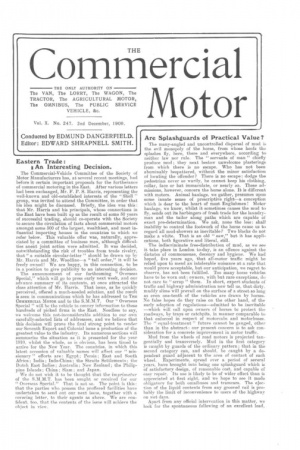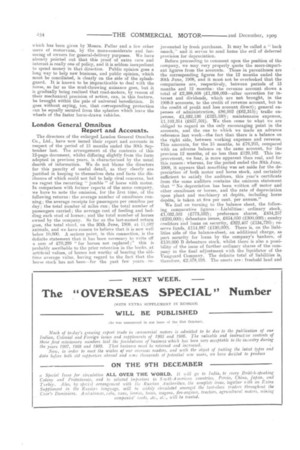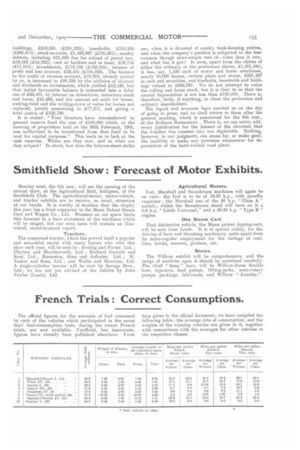Eastern Trade:
Page 1

Page 2

Page 3

If you've noticed an error in this article please click here to report it so we can fix it.
1 An Interesting Decision.
The Commercial-Vehicle Committee of the Society of Motor Manufacturers has, at several recent meetings, had before it certain important proposals for the furtherance of commercial motoring in the East. After various letters had been exchanged, Mr. F. P. S. Harris, representing the well-known and old-established interests of the " Shell " group, was invited to attend the Committee, in order that his idea might be discussed. Briefly, the idea was this : that Mr. Harris and his principals, whose connections in the East have been built up as the result of some 50 years of successful trading, should co-operate with the Society to secure the circulation of facts about commercial motors amongst some 500 of the largest, wealthiest, and most influential importing houses in the countries to which we refer below. This valuable offer was, naturally, appreciated by a committee of business men, although difficulties anent joint action were admitted. It was decided, notwithstanding the risk of troubles from trade rivalry, that" a suitable circular-letter" should be drawn up by Mr. Harris and Mr. Woodfine—a "tall order," it will be freely owned! We are happy, in this connection, to be in a position to give publicity to an interesting decision.
The announcement of our forthcoming "Overseas Special," which will go to press early next week, and our advance summary of its contents, at once attracted the close attention of Mr. Tfarris. That issue, as he quickly perceived, offered a much-needed solution, and the result is seen in communications which he has addressed to THE COMMERCIAL MOTOR and to the S.M.M.T. OUT "Overseas Special " will be the vehicle to convey information to these hundreds of picked firms in the East. Needless to say, we welcome this not-inconsiderable addition to our own carefully-selected lists of addressees, and we believe that this decision will prove the final strong point to render our Seventh Export and Colonial issue a production of the greatest value to the industry. Its numerous sections will summarize the situation as it is presented for the year 1910, whilst the whole, as is obvious, has been timed to arrive for the New Year. The countries, in which this latest accession of valuable names will affect our " missionary" efforts are: Egypt ; Persia.; East and South Africa ; India ; Judo-China; the Straits Settlements ; the Dutch East Indies ; Australia; New Zealand ; the Philippine Islands ; China; Siam ; and Japan.
We do not wish it to be thought that the imprimatur of the S.M.M.T. has been sought or received for our " Overseas Special." That is not so. The point is this: that the parties who possess the proffered facilities have undertaken to send out our next issue, together with a covering letter, to their agents as above. We are confident. too, that the contents of the issue will achieve the °Neel in view. IAre Splashguards of Practical Value ? is The many-angled and uncontrolled dispersal of mud the evil monopoly of the horse, from whose hoofs the splashes fly, here, there and everywhere, according to neither law nor rule. The " servants of man " chiefly
produce mud ; they next bestow unwelcome plasterings from which there is no escape. Who has not been abominably bespattered, without the minor satisfaction
of lorating the offender ? There is no escape: dodge the
pedestrian never so warily, he cannot keep his clothing, collar, face or hat immaculate, or nearly so. These ad missions, however, concern the horse alone. It is different with motors. Animal haulage. we gather, presumes upon some innate sense of prescriptive right—a conception which is dear to the heart of most Englishmen ! Motor haulage, we know, whilst it sometimes causes the mud to fly, sends out its harbingers of fresh trade for the laundry man and the tailor along paths which are capable of exact pre-determination. We ask, none the less : shall inability to control the footwork of the horse cause us to regard all mud-showers as inevitable? Two blacks do not make a white. That is an old "saw," but it has applications, both figurative and literal, still.
The indiscriminate free-distribution of mud, as we see it take place in London to-day, is an offence against the dictates of commonsense' decency and hygiene. We had
hoped, five years ago, that all-motor traffic might be relied upon to mend an intolerable nuisance at a rate that would prove acceptable, but our anticipation, we regret to observe, has not been fulfilled. Too many horse vehicles have to be worn out: owners, with but rare exceptions, do not care to " scrap " them. In short, expert students of traffic and highway administration now tell us, that dirty. muddy slime will prevail on the surface of a street so long as even one-tenth of the vehicles are drawn by horses. No false hopes do they raise on the other hand, of the early adoption of regulations—admitted to be inevitable —which will call upon owners of horses to protect the roadways, by trays or catalpas, in manner comparable to that enforced in respect of motorcabs and motorbuses.
The " eanal-treatment " future cannot be gauged, other than in the abstract: our present concern is to ask consideration for a concrete improvement in motor traffic. Mud from the wheels of road motors is projected tangentially and transversely. Mud in the first category is caught by guards of the ordinary pattern ; that in the
second category can, and should, be caught by a dependent guard adjacent to the area of contact of each
wheel. Experiments, spread over a period of several
years, have brought into being one splashguard which is of satisfactory design, of reasonable cost, and capable of easy repair. Its use is likely to be of wider effect than is
appreciated at first sight. and we hope to see it made obligatory for both omnibuses and tramcars. The ejec tion of the liquid contents from any grooved rail is probably the limit of inconvenience to users of the highway on wet days.
Apart from any official intervention in this matter, we look for the spontaneous following of an excellent lead, which has been given by Messrs. Pullar and a few other users of motorvaas, by the more-considerate and far-, seeing of owners for general-delivery purposes. We have already pointed out that this proof of extra care and interest, is really one of policy, and it is seldom inexpedient to spend money in that direction. Public opinion goes a long way to help new business, and public opinion, which must be conciliated, is clearly on the aide of the splashguard. It is known to be impracticable to deal with the horse, so far as the mud-throwing nuisance goes, but it is gradually being realized that road-motors, by reason of their mechanical precision of action, can, in this feature, be brought within the pale of universal benediction. It goes without saying, too, that corresponding protection ean be equally secured from the splashes which leave the wheels of the faster horse-drawn vehicles.
London General Omnibus Report and Accounts.
The directors of the enlarged London General Omnibus Co., Ltd., have new issued their report and accounts in respect of the period of 15 months ended the 30th September last. The arrangement of the contents of this 12-page document, whilst differing slightly from the form adopted in previous years, is characterized by the usual dearth of information. We do not blame the directors for this paucity of useful detail, as they clearly are justified in keeping to themselves data and facts the disclosure of which could not fail to help rival concerns, but we regret the recurring " jumble " of horse with motor. In comparison with former reports of the same company, we have to note the omission, for the first, time, of the following returns: the average number of omnibuses running; the average receipts for passengers per omnibus per day; the total number of miles run; the total number of passengers carried; the average cost of feeding and bedding each stud of horses; and the total number of horses owned by the company. So far as the last-named return goes, the total stood, on the 30th June, 1908, at 11,082 animals, and we have reason to believe that it is now well below 10,000. A serious point, in this connection, is the definite statement that it has been necessary to write off a sum of £70,299 "for horses not replaced ;" this is probably ascribable to the prior retention in the books, at artificial values, of horses not worthy of bearing the oldtime average value, having regard to the fact that the horse stock has not been—for the past few yearsre juvenated by fresh purchases. It may be called a " back smack," and it serves to send home the evil of deferred provision for depreciation.
Before proceeding to comment upon the position of the company, we may very properly quote the more-important figures from the accounts. Those in parentheses are the corresponding figures for the 12 months ended the 30th June, 1908, and it must not be overlooked that the comparisons are, respectively, between periods of 15 months and 12 months: the revenue account shows a total of £2,388,608 (£1,098,093—after correction for interest and dividends, which are not brought, in the 1908-9 accounts, to the credit of revenue account, but to the credit of profit and loss account direct); general expenses of administration, £86,952 (£62,315); traffic expenses, £1,032,136 (£525,530); maintenance expenses, £1,193,314 (£657,501). We then come to what we are obliged to regard as the only encouraging point in the accounts, and the one to which we made an advance reference last week—the fact that there is a balance on the right side, between working expenses and revenue. This amounts, for the 15 months, to £76,205, compared with an adverse balance on the same account, for the previous 12 months, of no less than £129,162. This improvement, we fear, is more apparent than real, and for this reason: whereas, for the period ended the 30th June, 1908, it appears that something was set aside for the depreciation of both motor and horse stock, and certainly sufficient to satisfy the auditors, this year's certificate from the same auditors contains the ominous statement that " No depreciation has been written off motor and other omnibuses or horses, and the rate of depreciation upon plant and machinery at depots, including horse depots, is taken at five per cent. per annum."
We find on turning to the balance sheet, the following comparative figures:--Liabilities: ordinary stack, £1,032,592 (2773,592); preference shares, £454,257 (£250,000); debenture issues, £654,050 (£300,000); sundry creditors and loans on security, £322,407 (£134,726); reserve funds, £114,887 (£130,000). There is, on the liabilities side of the balance-sheet, an additional charge, as part security for loans by the company's bankers, of £150,000 B debenture stock, whilst there is also a possibility of the issue of further ordinary shares of the company in the final adjustment with the liquidator of the Vanguard Company. The definite total of liabilities is, therefore, £2,578,193. The assets are: freehold land and buildings, £316,931 (V281,229); leaseholds, L516,300 (£386,815); stock-in-trade, £1,426,387 (£700,367); sundry debtors, including 221,933 due for refund of petrol tax, £53,682 (X14,022); eash at bankers and in hand, .£52,754 (£11,912); investments, £178,733 (£132,009); balance of profit and loss account, £33,401 (L194,933). The balance to the credit of revenue account, £76,205, already quoted by us, is increased to £89,388 by the addition of interest and dividends on investments, which yielded £13,133, but that initial favourable balance is converted into a debit one of £33,401, by interest on debentures, debenture stock and loans, £45,482, and the amount set aside for leases. sinking-fund and the writing-down of value for horses not
• replaced, jointly amounting to £77,257, and giving a total contra of £122,739.
It is stated: " Your directors have retransferred to general reserve fund the sum of £100,000 which, at the meeting of proprietors held on the 26th February, 1901, was authorized to be transferred from that fund to be used for capital purposes." This leads us to look at the cash reserves. Where are they now, and to what are they subject? In short, how does the balance-sheet strike one, when it is divested of sundry book-keeping entries, and when the company's position is subjected to the lesecommon though more-simple test of-what does it owe, and what has it got? It owes, apart from the claims of either the ordinary or the preference shares, £1,091,344; it has, say, 1,100 each of motor and horse omnibuses, nearly 10,000 horses, certain plant and stores, £231,487 in cash and securities, and freeholds, leaseholds and buildings valued at £883,237. We do not attempt to value the rolling and horse stock, but it is clear to us that the annual depreciation is not less than £120,000. There is, therefore, little, if anything, to cheer the preference and ordinary shareholders.
The report and accounts hue reached us on the day of going to press, and we shall return to them after the general meeting, which is announced for the 8th inst., at the Holborn Restaurant. There is, we can safely add, every justification for the lament of the directors that the weather this summer (sic) was deplorable. Nothing, however, in our judgment, can atone for, or make good, the inability to make any provision whatsoever for depreciation of the hard-worked road plant.


















